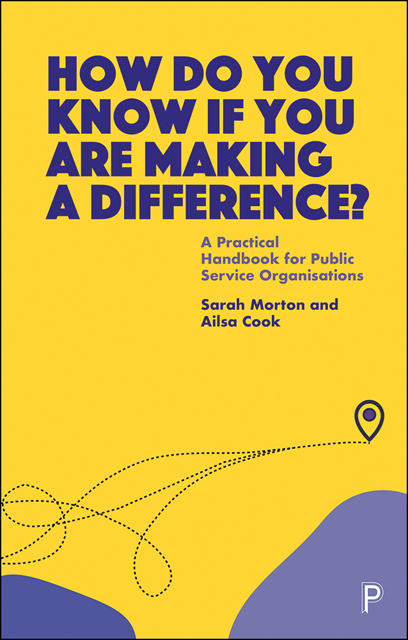 How Do You Know If You Are Making a Difference?
How Do You Know If You Are Making a Difference? Book contents
- Frontmatter
- Dedication
- Contents
- List of figures and tables
- Acknowledgements
- Preface
- 1 Why is it so hard to know if you are making a difference?
- 2 Why complexity thinking can help you understand public services
- 3 What data and evidence do you need to see what difference you are making?
- 4 Embrace the complex contex
- 5 Embrace the complex context
- 6 Clarify the change you want to see
- 7 Get going on your data, evidence and feedback improvement journey
- 8 Tracking progress towards outcomes and impacts
- 9 Telling the story of the difference your work makes
- 10 Using this approach in different contexts and sectors
- 11 Becoming an outcome- and impact-focused organisation
- References
- Index
9 - Telling the story of the difference your work makes
Published online by Cambridge University Press: 20 June 2023
- Frontmatter
- Dedication
- Contents
- List of figures and tables
- Acknowledgements
- Preface
- 1 Why is it so hard to know if you are making a difference?
- 2 Why complexity thinking can help you understand public services
- 3 What data and evidence do you need to see what difference you are making?
- 4 Embrace the complex contex
- 5 Embrace the complex context
- 6 Clarify the change you want to see
- 7 Get going on your data, evidence and feedback improvement journey
- 8 Tracking progress towards outcomes and impacts
- 9 Telling the story of the difference your work makes
- 10 Using this approach in different contexts and sectors
- 11 Becoming an outcome- and impact-focused organisation
- References
- Index
Summary
Building a strong contribution story that explains and can evidence the difference your work makes to people, policy, practice or communities is not an easy task. Teams and organisations tell us how challenging it is to report on what difference their work has made and there is often a gap between the valuable work they do and the story they’re able to tell about it. This is compounded because there are probably multiple stories they want to tell, to and with different people, for different purposes. Many organisations are great at explaining the richness of the work they do to support, empower or inspire people, but find it harder to link that to what difference it has made. Of course, our outcome mapping and tracking approach really helps to frame the process and make those links between activities and outcomes or impacts.
In this chapter we bring together our learning from working with many organisations and clients, as well as our own work in outcome and impact reporting. Thinking and using the language of ‘contribution’ – that is what contribution an initiative makes – can help make claims about this much clearer and stronger.
This chapter will consider:
• reporting in an outcome and impact-focused way;
• reporting for different audiences and purposes;
• using an outcome map as a framework for reporting;
• practical tips for great reporting;
• taking reporting forward.
We hope by reading this chapter you will understand how outcome- focused reporting can help you highlight the difference your work makes. This is the final part of the process we have described in Chapters 5 to 8, and a crucial one in making the case for your work. This chapter also aims to help think about different kinds of reporting for different purposes: reporting as a learning and improvement tool, as well as for sharing more widely.
Reporting in an outcome- and impact- focused way
There are many benefits of reporting in an outcome- and impactfocused way. While there is a lot of interest in the things that organisations do, it’s only possible to understand their importance if the question of what difference they made is also clearly part of the story.
- Type
- Chapter
- Information
- How Do You Know If You Are Making a Difference?A Practical Handbook for Public Service Organisations, pp. 136 - 151Publisher: Bristol University PressPrint publication year: 2022


